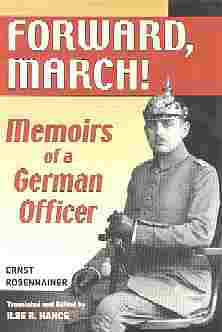From Great War Society Member
|
 |
By next morning [December 3, 1914] we had gained a firm foothold on these hills. The enemy line was broken, unable to resist any longer. When our cannons started firing again, we saw droves of fur-capped soldiers running toward us. To be sure, these brave Siberians had fought long and hard. Whoever was not dead or wounded saved himself by coming over to us. They arrived understandably frightened and hesitating, but obviously glad to save their lives in the shelter of our trenches because they were still threatened by their own guns. I saw one Siberian hit by a Russian bullet just outside our trench. A few of them were still staying behind in their trenches. But they were not able to hold on to their position, and on December 4, 1914 we were marching in extended order through the village of Bechcice until we came upon a kiln that was hit hard by bullets. The Russians could not have withdrawn very far, for already we were being targeted by heavy artillery fire.
It was a clear, star-lit night and extremely cold, so by the time we reached the kiln in the evening, we felt frozen through and through, dead tired and half starved. Once again we had to dig trenches. Part of the company attempted to find shelter in houses; others sought refuge in the brick kiln, always under attack by heavy artillery I entered the home of the brick-maker himself—it belonged to a German family The rooms were empty and deserted. Blessings in German decorated the walls. The various rooms were in complete disarray. An open German catechism was lying on the table. Next to it were Christmas tree decorations from gold and silver paper evidently made by the children for the approaching Christmas season. It was heartbreaking. The family had escaped; only a dog was crouching under the bench snarling at me. Immediately I turned and walked over to the office of the brick kiln where still other officers and troops had found quarters.

Early Billet in a Polish House, Owner in Doorway
Lt. Rosenhainer is Standing, Third from Left
We have barely reached the top of a hill when we see before us a heavily fortified Russian trench. Explosives are whizzing past our ears, and black "trees" rise from the earth where shells hit the ground. One fellow next to me gets a direct hit to his head. Blood comes shooting out of his temple, a moan, and his head tilts over toward the ground. Our losses are growing. With our spades we try desperately to dig in, but the ground is hard as rock. We then try crawling back up and behind the hill on all fours, but then the game starts all over again. This time we are more successful.

Photo Postcard Sent to Lt. Rosenhainer When He Was Recuperating from a Wound after the Battle for Lodz
To the left of us we heard the din of battle, but all remained quiet where we were. Would we attack the enemy? This didn't seem like a good idea since the Russians were in strong, well-fortified trenches, but to our surprise, they deserted their lines the next day Pressured by the advancing German troops, they were forced to withdraw behind the city of Lodz. So we followed them on the morning of December 6. Since we didn't know how far the Russians had retreated, we moved forward carefully in open formation. Now we saw firsthand the strong enemy entrenchments: barricades made with wire and branches, as well as wolf traps. These were so well camouflaged with twigs and moss that even in broad daylight one of my men fell through. After some time we finally reached the highest point from where, to our great surprise, we had an unexpected view: a large plain and in the background row upon row of houses, part of the city of Lodz.

